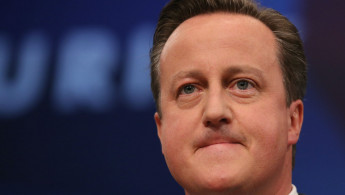Cameron defends 'squalid' deal with Saudi Arabia
David Cameron was being interviewed by Jon Snow for the UK's Channel 4 television news.
The prime minister's defence of the deal came despite Saudi Arabia's poor human rights record.
The kingdom is planning to execute Ali Mohammed al-Nimr for taking part in Arab Spring-style pro-reform protest in Qatif in the eastern part of the country in 2012. Nimr was a 17-year-old schoolboy at the time.
Nimr is reportedly to be beheaded, then his body crucified in public for three days.
Cameron said he would try to personally raise Nimr's case with the Saudi authorities if there was the right opportunity.
| Cameron said it was because the Saudi gives the UK important intelligence and security information. |
"We oppose the death penalty anywhere and everywhere in all our international contacts," Cameron added.
In August, Cameron authorised a a Royal Air Force drone strike to kill Reyaad Khan and Ruhul Amin, two British IS fighters in Syria.
The prime minister stumbled for a response when Snow asked about the recently exposed secret deal with the Saudis to allow both nations' election to the UN Human Rights Council in 2013.
Wikileaks released information about the deal earlier this week.
Both countries were later elected to the 47-member council until 2016.
Snow asked Cameron why, if he "completely disagreed" with the repressive state over its "punishment routines", the UK had agreed to the deal, the prime minister awkwardly claimed to have already answered such a question.
The Conservative leader finally said it was because the British government had "a relationship with Saudi Arabia".
Cameron said this was the basis of receiving important intelligence and security information from Riyadh.
"The reason we have the relationship is our own national security. There was one occasion since I've been prime minister where a bomb that would have potentially blown up over Britain was stopped because of intelligence we got from Saudi Arabia.
"Of course it would be easier for me to come on your programme and say: 'I'm not having anything to do with these people, it's all terribly difficult etcetera etcetera.' For me, Britain's national security and our people's security comes first," he added.



